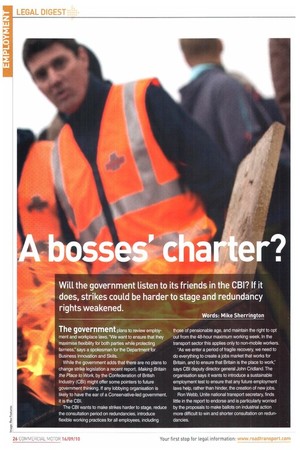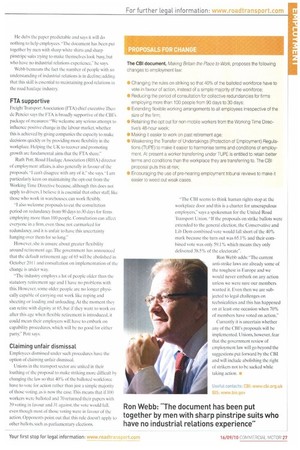Will the government listen to its friends in the CBI?
Page 26

Page 27

If you've noticed an error in this article please click here to report it so we can fix it.
If it does, strikes could be harder to stage and redundancy rights weakened.
Words: Mike Sherrington The government plans to review employment and workplace laws. "We want to ensure that they maximise flexibility for both parties while protecting fairness," says a spokesman for the Department for Business Innovation and Skills.
While the government adds that there are no plans to change strike legislation a recent report, Making Britain the Place to Work. by the Confederation of British Industry (CBI) might offer some pointers to future government thinking. If any lobbying organisation is likely to have the ear of a Conservative-led government, it is the CBI.
The CBI wants to make strikes harder to stage, reduce the consultation period on redundancies. introduce flexible working practices for all employees, including those of pensionable age, and maintain the right to opt out from the 48-hour maximum working week. In the transport sector this applies only to non-mobile workers As we enter a period of fragile recovery, we need to do everything to create a jobs market that works for Britain, and to ensure that Britain is the place to work," says CBI deputy director general John Cridland The organisation says it wants to introduce a sustainable employment test to ensure that any future employment laws help, rather than hinder, the creation of new Jobs.
Ron Webb, Unite national transport secretary. finds little in the report to endorse and is particularly worried by the proposals to make ballots on industrial action more difficult to win and shorter consultation on redundancies. He dubs the paper predictable and says it will do nothing to help employees The document has been put together by men with sharp white shirts and sharp pinstripe suits trying to make themselves look busy, but who have no industrial relations experience." he says.
Webb bemoans the fact the number of people with an understanding of industrial relations is in decline: adding that this skill is essential to maintaining good relations in the road haulage industry.
FTA supportive
Freight Transport Association (FTA) chief executive Theo de Pencier says the F1'A is broadly supportive of the CBI's package of measures:"We welcome any serious attempt to influence positive change in the labour market, whether this is achieved by giving companies the capacity to make decisions quickly or by providing more flexibility in the workplace. Helping the UK to recover and promoting growth are fundamental aims that the FTA share."
Ruth Pon, Road I laulage Association (RHA) director of employment affairs, is also generally in favour of the proposals "I can't disagree with any of it." she says. "I am particularly keen on maintaining the opt-out from the Working Time Directive because, although this does not apply to drivers, I believe it is essential that other staff, like those who work in warehouses, can work flexibly.
"I also welcome proposals to cut the consultation period on redundancy from 90 days to 30 days for firms employing more than 100 people. Consultation can affect everyone in a firm. even those not earmarked for redundancy. and it is unfair to have this uncertainty hanging over them for so long."
However, she is unsure about greater flexibility around retirement age. The government has announced that the default retirement age of 65 will be abolished in October 20 I 1 and consultation on implementation of the change is under way.
"The industry employs a lot of people older than the statutory retirement age and I have no problems with this. However, some older people arc no longer physically capable of carrying out work like roping and sheeting or loading and unloading. At the moment they can retire with dignity at 65, but if they want to work on after this age when flexible retirement is introduced, it could mean their employers will have to embark on capability procedures. which will be no good for either party," Pott says.
Claiming unfair dismissal
Employees dismissed under such procedures have the option of claiming unfair dismissal.
Unions in the transport sector are united in their loathing of the proposal to make striking more difficult bv changing the law so that 40% of the balloted workforce have to vote for action rather than just a simple majoritv of those voting, as is now the case. Ibis means that if 100 workers were balloted and 70 returned their papers with 39 voting in favour and 31 against, the vote would fall. even though most of those voting were in favour of the action. Opponents point out that this rule doesn't apply to other ballots, such as parliamentary elections. "The CBI seems to think human rights stop at the
workplace door and this is a charter for unscrupulous employers,says a spokesman for the United Road Transport Union."ff the proposals on strike ballots were extended to the general election, the Conservative and Lib Dem combined vote would fall short of the 40% mark because the turn out was 65.1% and their combined vote was only 59.1% which means they only delivered 38.5% of the electorate".
Ron Webb adds: "The current anti-strike laws are already some of the toughest in Europe and we would never embark on any action unless we were sure our members wanted it. Even then we are subjected to legal challenges on technicalities and this has happened on at least one occasion when 70% of members have voted on action."
Currently it is uncertain whether any of the CBI's proposals will be implemented. Unions, however, fear that the government review of employment law will go beyond the suggestions put forward by the CBI and will include abolishing the right of strikers not to be sacked while taking action.
Useful contacts: CBI: www.cbi.org.uk BiS: vvvvw.bis.gov




























































































































